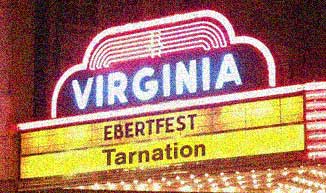|
|
 |
|
|
|
Tarnation |
|
|
|
So now that we have that out of
the way, let me simply add that “Tarnation” has not been invited to the
festival because of its cost, but because of its achievement. This is a
powerful and heartbreaking film about three generations of a family in
crisis, and Caouette shows himself to be a documentarian of rare skill
in the way he uses his materials. He begins with old photographs, family
movies, answering machine messages, his own first films, and his
memories. He adds new video footage of his more recent life. And he
organizes this material in a collage that envelops us in his family
story. |
|
|
|
Like many family stories, the one
in “Tarnation” has more than one version and probably more than one
truth, and the bravest thing Caouette does is to acknowledge that. What
the audience gets is essentially what he has gathered from his life, his
family history, the stories he has heard, the events he has witnessed or
guessed about. Narration and subtitles help orient us throughout the
story, but they also provide a certain ironic distance: There is a
disconnect between a subtitle flatly identifying an event, and the
ambiguity of the event itself. This kind of intensely personal
and subjective autobiographical filmmaking has always been there at the
fringes of the cinema (one thinks of Stan Brakhage), but new computer,
video and editing tools now bring it toward general audiences. When the
Oscar-nominated documentary “Capturing the Friedmans” played at Sundance
2003, it was observed by many critics that documentaries of the future
would be substantially different because so much home video footage is
now available; hours and hours of it, instead of a few fugitive minutes
from an old hand-wound 8mm movie camera. “Tarnation” is a moving and
technically impressive work by a filmmaker assembling his story through
the consideration of a lifetime of memories in many different forms. |
|
